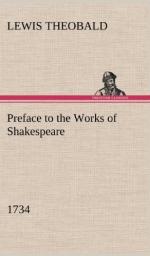As I have mention’d the Sweetness of his Disposition, I am tempted to make a Reflexion or two on a Sentiment of his, which, I am persuaded, came from the Heart.
The Man, that hath no Musick in himself,
Nor is not mov’d with Concord of
sweet Sounds,
Is fit for Treasons, Stratagems, and Spoils:
The Motions of his Spirit are dull as
Night,
And his Affections dark as Erebus:
Let no such Man be trusted.——
[Sidenote: A Lover of Musick.]
Shakespeare was all Openness, Candour, and Complacence; and had such a Share of Harmony in his Frame and Temperature, that we have no Reason to doubt, from a Number of fine Passages, Allusions, Similies, &_c._ fetch’d from Musick, but that He was a passionate Lover of it. And to this, perhaps, we may owe that great Number of Sonnets, which are sprinkled thro’ his Plays. I have found, that the Stanza’s sung by the Gravedigger in Hamlet, are not of Shakespeare’s own Composition, but owe their Original to the old Earl of Surrey’s Poems. Many other of his Occasional little Songs, I doubt not, but he purposely copied from his Contemporary Writers; sometimes, out of Banter; sometimes, to do them Honour. The Manner of their Introduction, and the Uses to which he has assigned them, will easily determine for which of the Reasons they are respectively employ’d. In As you like it, there are several little Copies of Verses on Rosalind, which are said to be the right Butter-woman’s Rank to Market, and the very false Gallop of Verses. Dr. Thomas Lodge, a Physician who flourish’d early in Queen Elizabeth’s Reign, and was a great Writer of the Pastoral Songs and Madrigals, which were so much the Strain of those Times, composed a whole Volume of Poems in Praise of his Mistress, whom he calls Rosalinde. I never yet could meet with this Collection; but whenever I do, I am persuaded, I shall find many of our Author’s Canzonets on this Subject to be Scraps of the Doctor’s amorous Muse: as, perhaps, those by Biron too, and the other Lovers in Love’s Labour’s lost, may prove to be.




